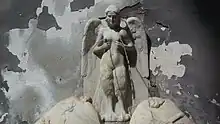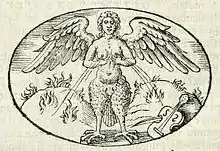Parthenope (Siren)
Parthenope (Ancient Greek: Παρθενόπη) was one of the Sirens in Greek mythology.[1][2][3][4] Her name means "maiden-voiced" from parthenos and ops.[5]: 20
 The Fountain of the Spinacorona, a depiction of Parthenope in Naples. | |
| Grouping | Mythological |
|---|---|
| Sub grouping | Siren |
| Family | Child of Achelous and Terpsichore |
| Folklore | Greek |
| Country | Greece |
| Region | Sirenum scopuli |
| Habitat | Seagirt meadows |

Family
Parthenope was the daughter of the god Achelous and the Muse Terpsichore.[5]: 35 [6] Her two sisters were called Ligeia, and Leucosia.[4][2][7][8]
Mythology
According to Greek legend, Parthenope cast herself into the sea and drowned when her songs failed to entice Odysseus.[9][10]: 293 Her body washed ashore at Naples, on the island of Megaride, where the Castel dell'Ovo is now located.[11] Her tomb on the island was called "constraction of sirens".[12] When people from the city of Cumae settled there, they named their city Parthenope in her honour.[13]
A Roman myth tells a different version of the tale, in which a centaur named Vesuvius was enamored with Parthenope. Angered, Jupiter turned the centaur into a stratovolcano and Parthenope into the city of Naples. Thwarted in his desire, Vesuvius' rage is manifested in the volcano's frequent violent eruptions.[14]
In literature and art
Parthenope has been depicted in various forms of literature and art, from ancient coins that bore her semblance[6] to the Fountain of the Spinacorona, where she is depicted quenching the fires of Vesuvius with water from her breasts.[15] In his Georgics, Virgil stated that he had been nurtured by Parthenope, writing:
At that time sweet Parthenope was nurturing me, Virgil, as I flourished in the pursuits of my inglorious leisure...
In addition, Parthenope has served as the inspiration for a number of other works, such as Manuel de Zumaya's Partenope and the ancient Greek novel Mētiokhos kai Parthenopē.[16] Also, several operas based on the myth of Parthenope were composed on the 18th century by Sarro (1722), Vinci (1725), Handel (1730), Vivaldi (1738) and Hasse (1767).
Notes
- Lycophron, Alexandra 720
- Eustathius, l.c. cit.; Strabo, Geographica 5.246, 252
- Servius, Commentary on Virgil, Georgics 4.562
- Tzetzes, Chiliades 1.14, line 337 & 6.40
- Austern, Linda; Naroditskaya, Inna, eds. (2006). Music of the Sirens. Bloomington, Indiana: Indiana University Press. ISBN 0-253-21846-2. Retrieved 28 June 2014.
- Spink & Son (1906). The Numismatic Circular and Catalogue of Coins, Tokens, Commemorative & War Medals, Books & Cabinets, Volume 14. Piccadily: Spink & Son. p. 9010. Retrieved 28 June 2014.
- Lycophron, Alexandra 720-726
- Servius commentary on Virgil, Georgics 4.562
- Facaros, Dana; Pauls, Michael (2007). Bay of Naples and Southern Italy. Cape Town, South Africa: New Holland Publishers. p. 21. ISBN 978-1-86-011349-9. Retrieved 29 June 2014.
- Miles, Gary B. (1980). Virgil's Georgics: A New Interpretation. Berkeley and Los Angeles: University of California Press. p. 293. ISBN 0-520-03789-8. Retrieved 29 June 2014.
parthenope odysseus.
- Lancaster, Jordan (2005). In the Shadow of Vesuvius: A Cultural History of Naples. London and New York: I.B. Tauris. p. 11. ISBN 1-85043-764-5. Retrieved 30 June 2014.
- Lycophron, Alexandra 716
- Jansen, Laura, ed. (2014). The Roman Paratext: Frame, Texts, Readers. Cambridge UK: Cambridge University Press. p. 230. ISBN 978-1-107-02436-6. Retrieved 30 June 2014.
- Ledeen, Michael (2011). Virgil's Golden Egg and Other Neapolitan Miracles: an Investigation into the Sources of Creativity. New Brunswick, New Jersey: Transaction Publishers. p. 37. ISBN 978-1-4128-4240-2. Retrieved 30 June 2014.
- "Fontana di Spinacorona (detta Fontana delle zizze)". CorpodiNapoli. Retrieved 30 June 2014.
- Hägg, Thomas; Utas, Bo, eds. (2003). The Virgin and Her Lover: Fragments of an Ancient Greek Novel and a Persian Epic Poem. Leiden, Netherlands: Brill Publishers. p. 5. ISBN 90-04-13260-0. Retrieved 30 June 2014.
References
- John Tzetzes, Book of Histories, Book I translated by Ana Untila from the original Greek of T. Kiessling's edition of 1826. Online version at theio.com
- Lycophron, The Alexandra translated by Alexander William Mair. Loeb Classical Library Volume 129. London: William Heinemann, 1921. Online version at the Topos Text Project.
- Lycophron, Alexandra translated by A.W. Mair. London: William Heinemann; New York: G.P. Putnam's Sons. 1921. Greek text available at the Perseus Digital Library.
- Strabo, The Geography of Strabo. Edition by H.L. Jones. Cambridge, Mass.: Harvard University Press; London: William Heinemann, Ltd. 1924. Online version at the Perseus Digital Library.
- Strabo, Geographica edited by A. Meineke. Leipzig: Teubner. 1877. Greek text available at the Perseus Digital Library.